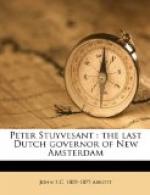Colonel Nicholls, as governor, had gifts of honor and opulence in his hands. As was to have been expected, there were a few Dutch citizens who were eager to gratify the governor by co-operating with him in all his plans. This number, however, was small. The great mass of the citizens assumed an air of indifference, while, in heart, they longed for the appearance of the Dutch fleet in such strength as to render resistance impossible.
But either the storms of the ocean, or some other engagements, arrested the progress of the squadron, until after the rupture between England and Holland was temporarily healed. Colonel Nicholls remained in command at New York about four years. His administration was as popular as could reasonably have been expected under the circumstances. He gradually relaxed the severity of his rule, and wisely endeavored to promote the prosperity of the colony. The conquest had retarded the tide of emigration from Holland, and had given a new impulse to that from England. The Dutch gradually became reconciled to his rule. They enjoyed all the rights and immunities which were conferred upon any of the subjects of England in her American colonies. Out of respect to the governor they organized two militia companies, the officers of which were from the most distinguished of the Dutch citizens, and they received their commissions from him.
In August of 1668, Colonel Nicholls, at his own request, was recalled, and he returned to England. The Dutch did not love him, for they never could forget the circumstances under which he had conquered their province. But he had won their respect. As he embarked for the shores of England the great body of the citizens complimented him by a respectful leave-taking.
Colonel Nicholls was succeeded in the government of the province, by Colonel Francis Lovelace. He was an English officer of respectable abilities, and of worthy character. Under his sway, New York for five years, until 1673, enjoyed prosperity and peace. New agitations then took place.
The peace, of which we have spoken, between England and Holland, was of but transient duration. In 1672 war was again declared by England. The conflict which ensued was mainly upon the ocean. New York had so grown since its conquest by the English, and could so easily be reinforced by almost any number of men from populous New England, that the Dutch did not think that there was any chance of their then being able to regain the colony. They, however, fitted out a fleet of five ships, to cruise along the coast of North America, destroy the English, and inflict such injury upon any and all of the English colonies as might be in their power.
Governor Lovelace had no idea that any Dutch ships would venture through the Narrows. He made no special effort to strengthen the defences of New York. Early in February he went to Westchester county, to visit at the residence of his friend Mr. Pell. This was quite a journey in those days. The command of the fort was entrusted, during his absence to Captain John Manning.




